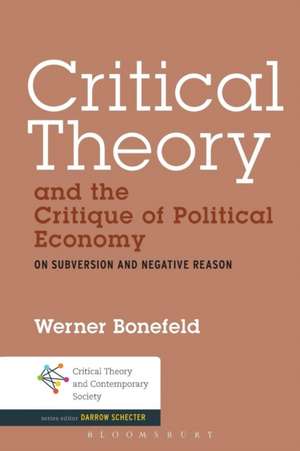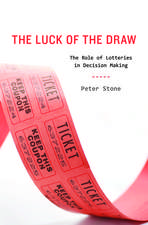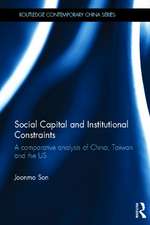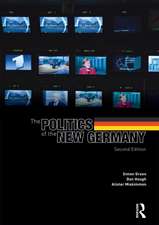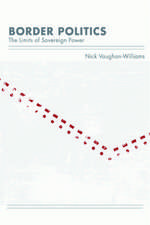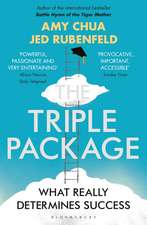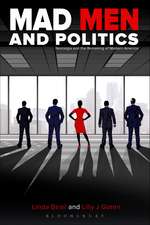Critical Theory and the Critique of Political Economy: On Subversion and Negative Reason: Critical Theory and Contemporary Society
Autor Dr. Werner Bonefelden Limba Engleză Paperback – 9 mar 2016
| Toate formatele și edițiile | Preț | Express |
|---|---|---|
| Paperback (1) | 257.21 lei 6-8 săpt. | |
| Bloomsbury Publishing – 9 mar 2016 | 257.21 lei 6-8 săpt. | |
| Hardback (1) | 831.83 lei 6-8 săpt. | |
| Bloomsbury Publishing – 2 iul 2014 | 831.83 lei 6-8 săpt. |
Din seria Critical Theory and Contemporary Society
-
 Preț: 208.70 lei
Preț: 208.70 lei -
 Preț: 345.05 lei
Preț: 345.05 lei -
 Preț: 155.55 lei
Preț: 155.55 lei -
 Preț: 206.64 lei
Preț: 206.64 lei -
 Preț: 177.90 lei
Preț: 177.90 lei -
 Preț: 155.23 lei
Preț: 155.23 lei - 23%
 Preț: 536.90 lei
Preț: 536.90 lei - 23%
 Preț: 536.99 lei
Preț: 536.99 lei - 22%
 Preț: 256.59 lei
Preț: 256.59 lei - 12%
 Preț: 278.94 lei
Preț: 278.94 lei -
 Preț: 278.32 lei
Preț: 278.32 lei - 13%
 Preț: 255.29 lei
Preț: 255.29 lei - 22%
 Preț: 832.65 lei
Preț: 832.65 lei - 31%
 Preț: 771.26 lei
Preț: 771.26 lei - 22%
 Preț: 889.88 lei
Preț: 889.88 lei -
 Preț: 237.75 lei
Preț: 237.75 lei - 13%
 Preț: 254.75 lei
Preț: 254.75 lei
Preț: 257.21 lei
Preț vechi: 331.02 lei
-22% Nou
Puncte Express: 386
Preț estimativ în valută:
49.22€ • 51.49$ • 40.88£
49.22€ • 51.49$ • 40.88£
Carte tipărită la comandă
Livrare economică 02-16 aprilie
Preluare comenzi: 021 569.72.76
Specificații
ISBN-13: 9781501317750
ISBN-10: 150131775X
Pagini: 256
Dimensiuni: 152 x 229 x 25 mm
Greutate: 0.35 kg
Ediția:NIPPOD
Editura: Bloomsbury Publishing
Colecția Bloomsbury Academic
Seria Critical Theory and Contemporary Society
Locul publicării:New York, United States
ISBN-10: 150131775X
Pagini: 256
Dimensiuni: 152 x 229 x 25 mm
Greutate: 0.35 kg
Ediția:NIPPOD
Editura: Bloomsbury Publishing
Colecția Bloomsbury Academic
Seria Critical Theory and Contemporary Society
Locul publicării:New York, United States
Caracteristici
Offers
a
critique
of
the
political
in
political
economy
as
the
concentrated
force
of
economy
Notă biografică
Werner
Bonefeldteaches
in
the
Department
of
Politics
at
the
University
of
York,
UK.
His
work
contributed
to
the
development
of
the
internationally
recognised
Open
Marxism
school.
Cuprins
DedicationAcknowledgments
1.
Introduction:
Critical
Theory
and
the
Critique
of
Political
EconomySection
I:
On
the
Critique
of
Political
Economy
as
a
Critical
Social
Theory2.
Political
Economy
and
Social
Constitution:
On
the
Meaning
of
Critique3.
Society
as
Subject
and
Society
as
Object:
On
Social
PraxisSection
II:
Value:
On
Social
Wealth
and
Class4.
Capital
and
Labour:
Primitive
Accumulation
and
the
Force
of
Value5.
Class
and
Struggle:
On
the
false
Society6.
Time
is
Money:
On
Abstract
LabourSection
III:
Capital,
World
Market
and
State7.
State,
World
Market
and
Society8.
On
the
State
of
Political
Economy:
Political
Form
and
the
Force
of
LawSection
IV
Anti-Capitalism:
Theology
and
Negative
Practice9.
Anti-Capitalism
and
theElementsof
Antisemitism:
On
Theology
and
Real
Abstractions
10.
Conclusion:
On
the
Elements
of
Subversion
and
Negative
ReasonSelected
BibliographyIndex
Recenzii
Bonefeld
successfully
both
reveals
the
supposedly
innate
contradictions
of
a
system
that
is
imposed
externally
on
us
and
succeeds
in
dissecting
the
most
pivotal
contradiction,
that
is,
how
our
own
labor
is
simultaneously
organized
as
concrete
and
abstract
labor.
Bonefeld's most accomplished work to date, and certainly represents a definitive statement on critique, negative dialectics, and Open Marxism ... a book which sets out his own unique vision of Marxism as Critical Theory that "moves" in reflexive and dialectical engagement with its definite subject matter: political economy and the inherently antagonistic social constitution of capital ... Critical Theory at its intelligent, robust and challenging best-argumentation this book delivers from cover to cover.
Exactly the kind of book we need ... We need a conceptual comprehension that sharpens and focuses our experience. We do not live in a world in which the abolition of capitalism seems imminent. In such conditions, especially when a thinker breaks through old theoretical integuments, the obligation is towards the very critique and critical theory that animates this book.
Compelling and persuasively argued account of the tasks with which critical theory is faced today, and of the failure of the larger part of Marxist theory to date adequately to address those tasks ... The book represents what is perhaps the most sustained and comprehensive exposition of the critique of political economy from its at times incipient formulation within Marx's oeuvre.
In the tradition of the best critical and Marxist theory, this brilliant, vital book encompassess and challenges everything ... [Bonefeld's prose] is audacious, breathtaking and exciting in a way unmatched in most 'academic writing' ... This book is a game-changer, theoretically practically, and politically. From within the field, Bonefeld gives considerable pause for thought to scholars working within value-form theory ... [and] even where Bonefeld cousels against the affirmation of alternatives, the book generates a sense of hope ... This urgent, stirring book of everything demands to be read.
A very rewarding read. It brings together a large array of ideas and provides devastating critiques of both capitalism and some of its Marxist critics. The book will no doubt appeal to those most associated with left communist ideas. That said, in a period where criticisms of capitalism have taken on no more than a dismal rejection of it as an unfair system ran by elites and corporations, I feel it is a must read for any person who considers themselves Marxist or anti-capitalist. Werner Bonefeld restates the fundamentals of the critique of political economy and provides us with a highly engaging and important piece of work.
Is Marx is an economic thinker? Bonefeld's lucid and original reading answers this question in the affirmative ... In an age when much of what passes as communist thought and practice is either the ossified dogmas of the past, or moralistic denunciations of the abstractions of wealth and finance, this book should, despite its density, act as a wake-up call to anyone who hopes for a reinvigoration of the anticapitalist left.
Werner Bonefeld's outstanding book revitalizes the best tradition of critical theory, which he proficiently combines with the critique of political economy and new readings of Marx. Bonefeld's book is essential for anyone who wants to understand the inverted world of capitalism and to fight its barbarism.
Bringing together Adorno'sCritical Theoryand Marx'sCritique of Political Economysheds rather new light on basic concepts of Marx'sCritiquelike the law of value, class, and state, and allows Werner Bonefeld to leave the usual roads of discussion travelled over the last four decades. This becomes clear not only when the relationship between economic law, labour, action, and force is discussed but also when the anti-capitalist implications of this approach are developed. This book is really a big step forward in the discussion of capitalism and its critiques.
Werner Bonefeld is one of the most rigorous and uncompromising critics of capitalism writing today. This book criticises and carries forward the most advanced thinking on critical theory and the critique of political economy. A must, a delight.
Reclaiming the Marxian critique of political economy for critical theory, Werner Bonefeld reveals an overlooked trajectory of the Frankfurt School leading from Adorno to 'the new reading of Marx.' Bonefeld pushes 'the new reading of Marx' to recognise the class structure enforced by the state's 'law-making violence' that underlies the law of value. Critical theory needs to be anti-capital, Bonefeld argues, and he makes good on that subversive demand with a critique of economic categories that exposes the social sources of 'the dazzling spell of the world of value.' Bonefeld writes at the frontiers of the renewal of critical theory as the critique of political economy.
In this important contribution [Bonefeld] uncovers within the critical theory of the Frankfurt School the foundations of a new and powerful reinterpretation of Marx's critique of political economy. . The book concludes that, rather than seeking scapegoats or imaginary futures, we should embrace uncertainty and strive to change our lived experience.
Even after several readings, I do not claim to have absorbed all the lessons of this remarkable text. ...[I]t is the starting point for a newly invigorated critique of political economy, because it brings production and reproduction, primitive accumulation, politics and crisis together into a single frame in which the central figure is the worker specific to the capitalist mode of production in its fully developed form - the dispossessed producer of surplus value in the world market.
Bonefeld's most accomplished work to date, and certainly represents a definitive statement on critique, negative dialectics, and Open Marxism ... a book which sets out his own unique vision of Marxism as Critical Theory that "moves" in reflexive and dialectical engagement with its definite subject matter: political economy and the inherently antagonistic social constitution of capital ... Critical Theory at its intelligent, robust and challenging best-argumentation this book delivers from cover to cover.
Exactly the kind of book we need ... We need a conceptual comprehension that sharpens and focuses our experience. We do not live in a world in which the abolition of capitalism seems imminent. In such conditions, especially when a thinker breaks through old theoretical integuments, the obligation is towards the very critique and critical theory that animates this book.
Compelling and persuasively argued account of the tasks with which critical theory is faced today, and of the failure of the larger part of Marxist theory to date adequately to address those tasks ... The book represents what is perhaps the most sustained and comprehensive exposition of the critique of political economy from its at times incipient formulation within Marx's oeuvre.
In the tradition of the best critical and Marxist theory, this brilliant, vital book encompassess and challenges everything ... [Bonefeld's prose] is audacious, breathtaking and exciting in a way unmatched in most 'academic writing' ... This book is a game-changer, theoretically practically, and politically. From within the field, Bonefeld gives considerable pause for thought to scholars working within value-form theory ... [and] even where Bonefeld cousels against the affirmation of alternatives, the book generates a sense of hope ... This urgent, stirring book of everything demands to be read.
A very rewarding read. It brings together a large array of ideas and provides devastating critiques of both capitalism and some of its Marxist critics. The book will no doubt appeal to those most associated with left communist ideas. That said, in a period where criticisms of capitalism have taken on no more than a dismal rejection of it as an unfair system ran by elites and corporations, I feel it is a must read for any person who considers themselves Marxist or anti-capitalist. Werner Bonefeld restates the fundamentals of the critique of political economy and provides us with a highly engaging and important piece of work.
Is Marx is an economic thinker? Bonefeld's lucid and original reading answers this question in the affirmative ... In an age when much of what passes as communist thought and practice is either the ossified dogmas of the past, or moralistic denunciations of the abstractions of wealth and finance, this book should, despite its density, act as a wake-up call to anyone who hopes for a reinvigoration of the anticapitalist left.
Werner Bonefeld's outstanding book revitalizes the best tradition of critical theory, which he proficiently combines with the critique of political economy and new readings of Marx. Bonefeld's book is essential for anyone who wants to understand the inverted world of capitalism and to fight its barbarism.
Bringing together Adorno'sCritical Theoryand Marx'sCritique of Political Economysheds rather new light on basic concepts of Marx'sCritiquelike the law of value, class, and state, and allows Werner Bonefeld to leave the usual roads of discussion travelled over the last four decades. This becomes clear not only when the relationship between economic law, labour, action, and force is discussed but also when the anti-capitalist implications of this approach are developed. This book is really a big step forward in the discussion of capitalism and its critiques.
Werner Bonefeld is one of the most rigorous and uncompromising critics of capitalism writing today. This book criticises and carries forward the most advanced thinking on critical theory and the critique of political economy. A must, a delight.
Reclaiming the Marxian critique of political economy for critical theory, Werner Bonefeld reveals an overlooked trajectory of the Frankfurt School leading from Adorno to 'the new reading of Marx.' Bonefeld pushes 'the new reading of Marx' to recognise the class structure enforced by the state's 'law-making violence' that underlies the law of value. Critical theory needs to be anti-capital, Bonefeld argues, and he makes good on that subversive demand with a critique of economic categories that exposes the social sources of 'the dazzling spell of the world of value.' Bonefeld writes at the frontiers of the renewal of critical theory as the critique of political economy.
In this important contribution [Bonefeld] uncovers within the critical theory of the Frankfurt School the foundations of a new and powerful reinterpretation of Marx's critique of political economy. . The book concludes that, rather than seeking scapegoats or imaginary futures, we should embrace uncertainty and strive to change our lived experience.
Even after several readings, I do not claim to have absorbed all the lessons of this remarkable text. ...[I]t is the starting point for a newly invigorated critique of political economy, because it brings production and reproduction, primitive accumulation, politics and crisis together into a single frame in which the central figure is the worker specific to the capitalist mode of production in its fully developed form - the dispossessed producer of surplus value in the world market.
